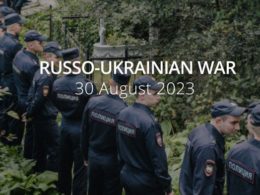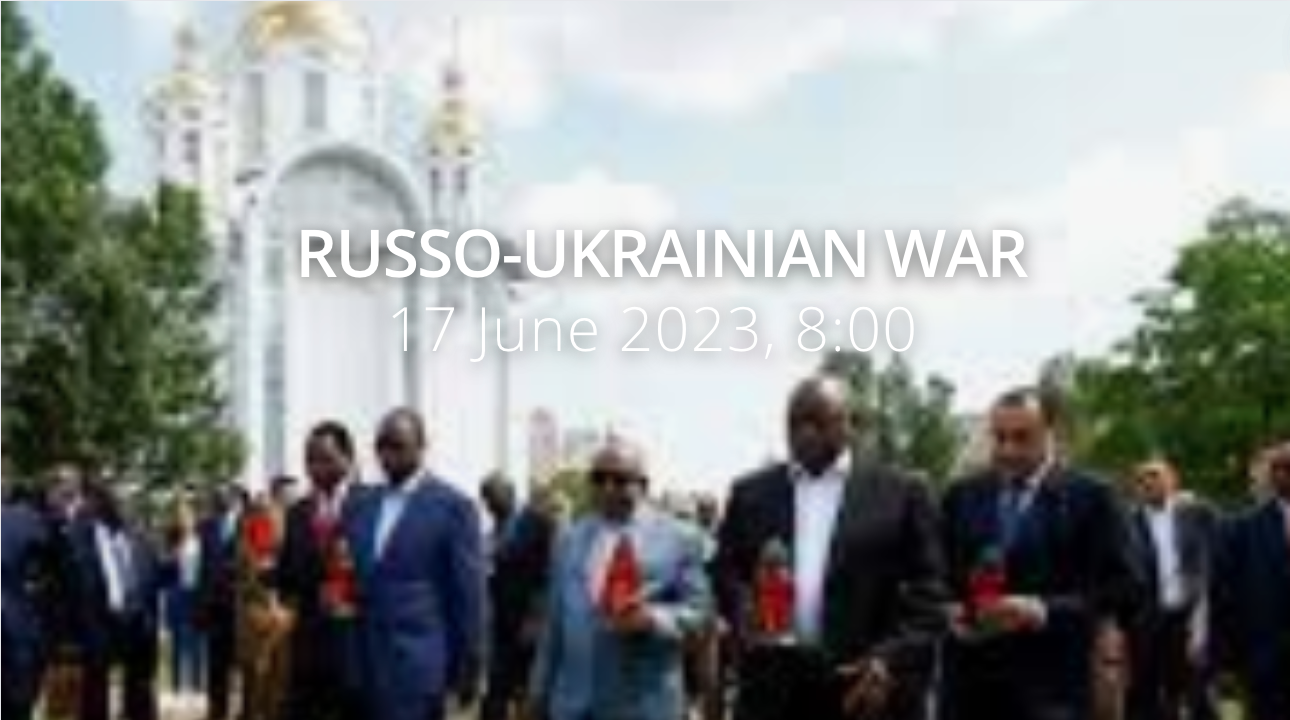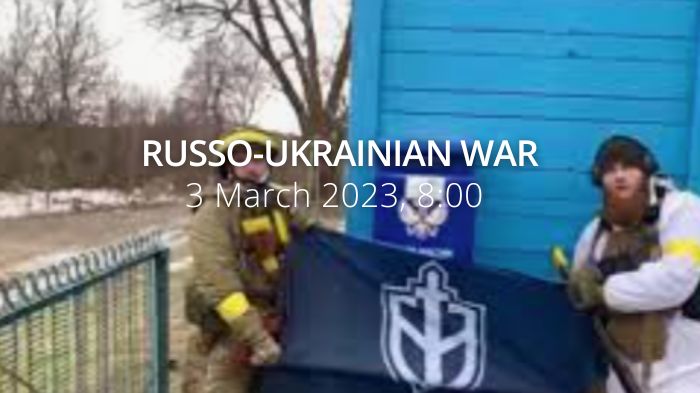Moscow’s municipal authorities to withdraw contracts from construction firms if they fail to hit quotas for providing ‘volunteers’ to serve in Ukraine. Ukraine liberates over 14 km² over the past week – General Staff.
Ukrainian intelligence has confirmed earlier Russian reports about the murder of Stanislav Rzhytskyi, former commander of the Krasnodar submarine, who is suspected of directing a missile strike that killed 27 Ukrainian civilians in Vinnytsia.https://t.co/6CAGSpaWSQ
— Euromaidan Press (@EuromaidanPress) July 11, 2023
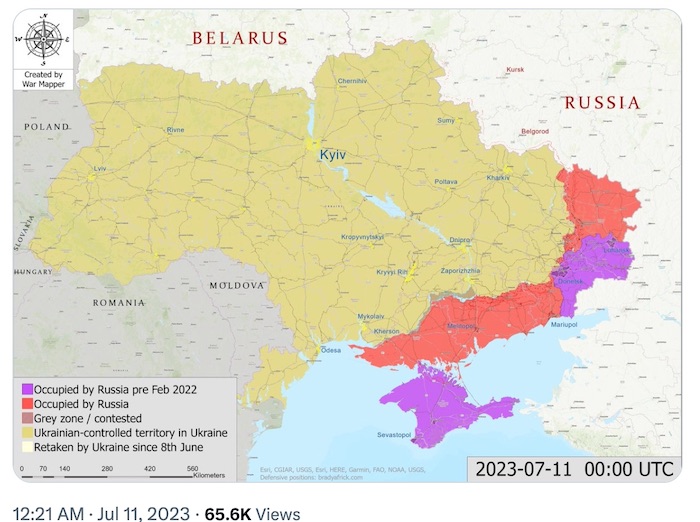
Daily overview — Summary report, July 11
The General Staff’s operational update regarding the Russian invasion as of 18.00 pm, July 11, 2023 is in the dropdown menu below:
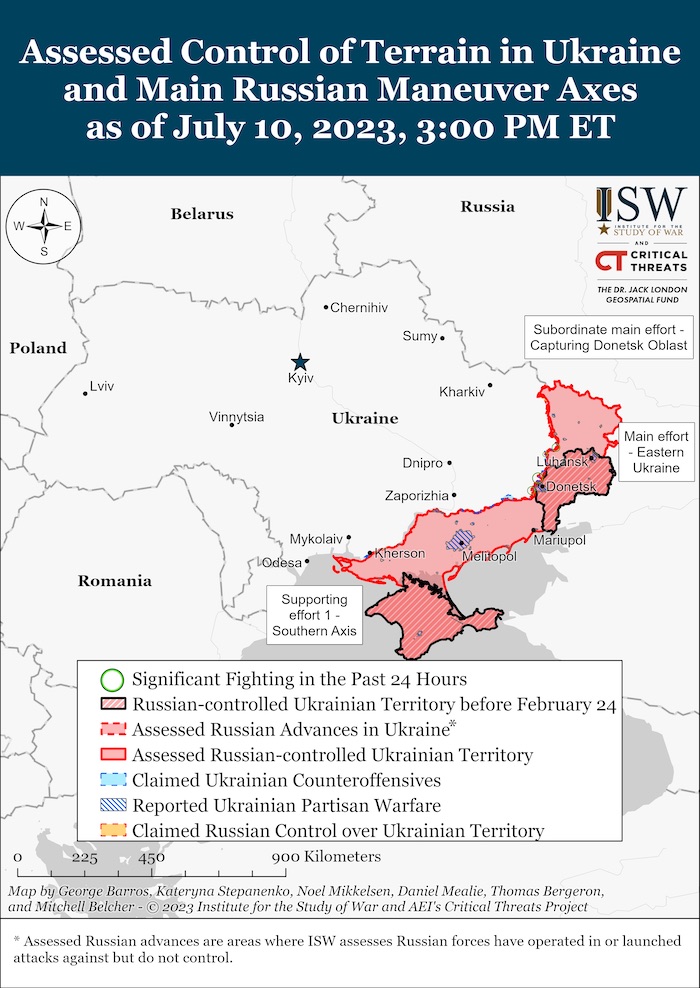
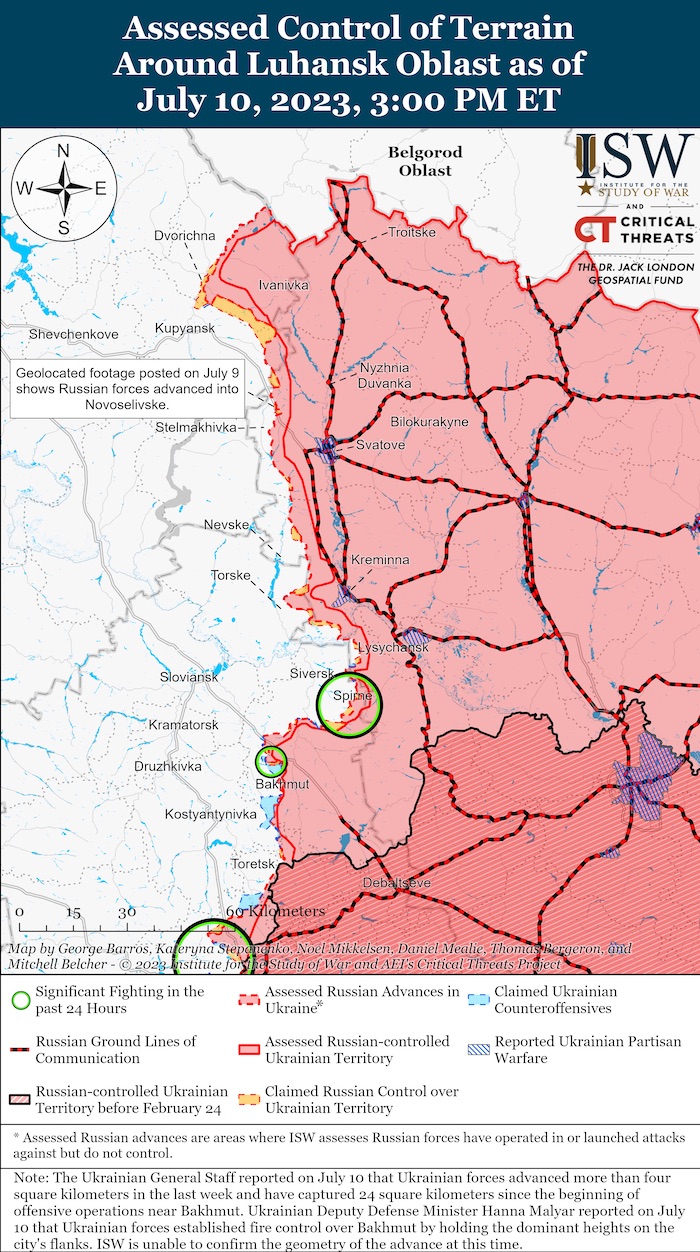
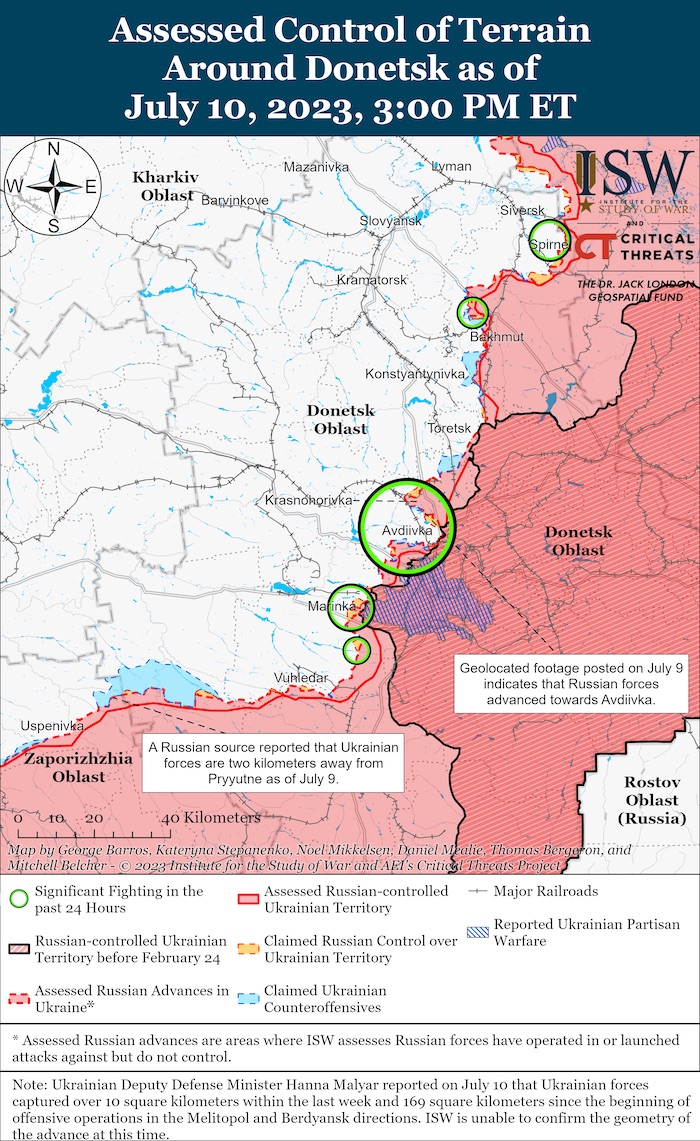
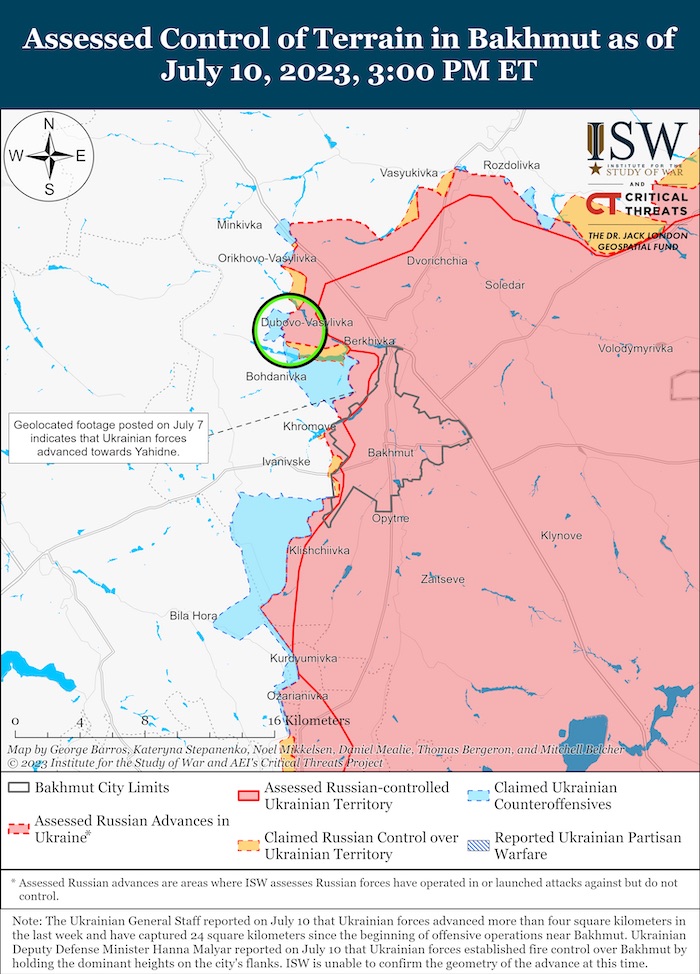
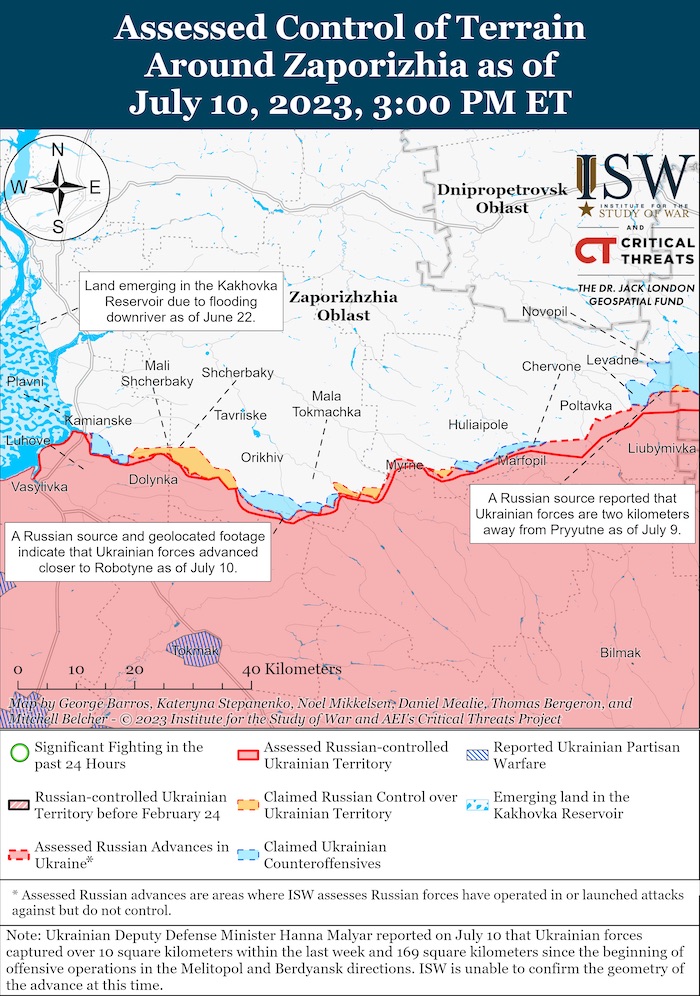
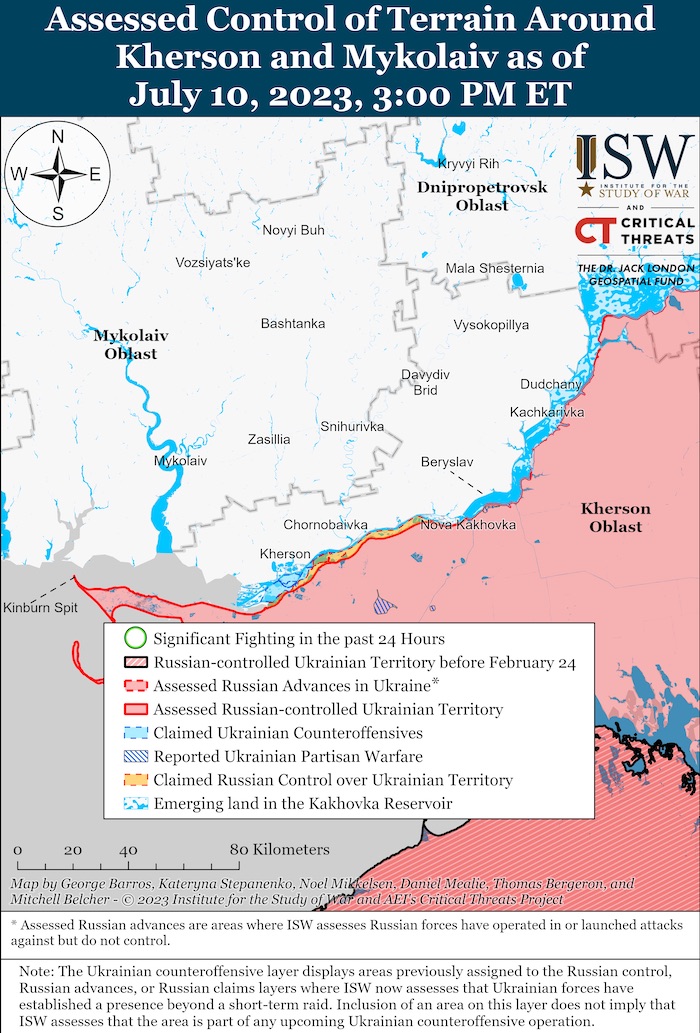
Military Updates
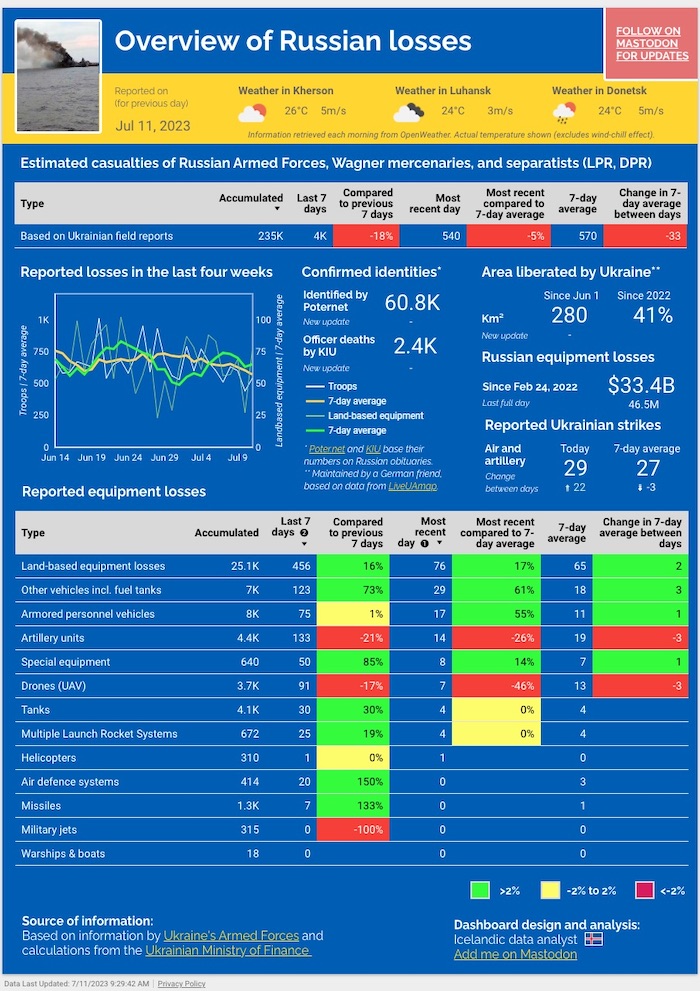
Ukraine regains more territory from Russian forces – Ukraine’s Defence Ministry. The Armed Forces of Ukraine have liberated more than 168,6 square kilometers of territory from the Russian forces on the southern front since the beginning of the counteroffensive operations, Deputy Defense Minister of Ukraine Hanna Maliar announced on 10 July. Ukraine’s Armed Forces conducted successful offensive and defensive operations on both the eastern and southern fronts within the past week, according to Hanna Maliar. On the eastern front, which covers the Donetsk and Luhansk oblasts, the Ukrainian troops improved their operational and tactical situation. At this point, the territory liberated by Ukraine’s Armed Forces on the eastern front amounts to 24 square kilometers. Russian forces launched 7,184 attacks on Ukrainian troops in this sector, using 343,402 artillery and rocket shells against the Ukrainian positions, according to Hanna Maliar.
Russian cross-border attacks force Sumy Oblast authorities to prepare evacuation from 5 km border zone. On 10 July, the authorities of Ukraine’s north-eastern Sumy Oblast announced preparations to evacuate residents from the five-kilometer zone near the border with Russia, citing constant cross-border artillery attacks by Russian forces and saboteur group activities. “The [Sumy] Regional Military Administration is preparing orders to evacuate people from the five-kilometer zone away from the state border of Ukraine,” the official announcement reads.
Ukraine liberates over 14 km² over the past week – General Staff. Over the past week, Ukrainian forces have liberated over 14 square kilometers, according to the General Staff of the Armed Forces of Ukraine. The Staff says the troops advanced more than one kilometer in the country’s south, reclaiming more than 10 square kilometers, and liberated four km² in the east near Bakhmut City, Donetsk Oblast.
Ukrainian forces advance near Bakhmut – Ukraine’s Defense Ministry. On Sunday, 9 July, the situation on the eastern and southern fronts did not change significantly, but there was some progress on the southern flank near Bakhmut, according to Deputy Defense Minister of Ukraine Hanna Maliar. On the eastern front, the Russian offensive has been halted in all directions (Avdiivka, Mariinka and Lyman in Donetsk Oblast, and Kupiansk in Kharkiv Oblast), according to Hanna Maliar. Heavy fighting in these areas continues, with no change in positions, Maliar said.
According to British Defence Intelligence, (last 48 hours):
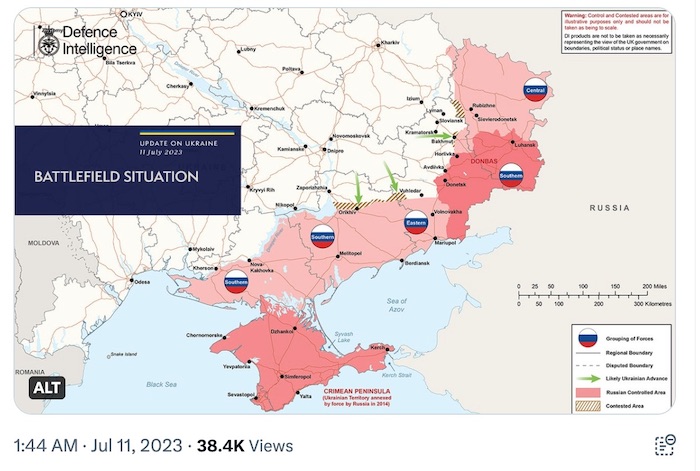
- Moscow’s municipal authorities are highly likely threatening to withdraw contracts from construction firms if they fail to hit quotas for providing ‘volunteers’ to serve in Ukraine. One company has reportedly been set a target of 30 volunteers by the end of August 2023.
- The move will likely primarily affect ethnic minorities from poorer regions of Russia such as Dagestan and central Asian states, who make up the majority of Moscow’s construction workers.
- This measure is highly likely at least tacitly endorsed by Moscow mayor Sergey Sobyanin. It continues his track record of trying to minimise the impact of the conflict on better-off Muscovites, while still being seen to support the war effort.
Losses of the Russian army
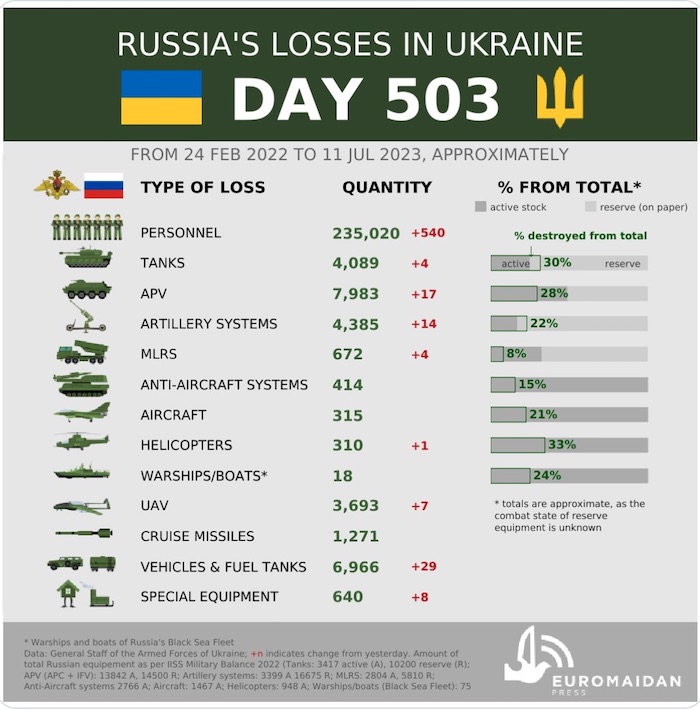
Humanitarian
Two civilians killed, three injured in Russian shelling of eastern Ukrainian towns. On 10 July, two people were killed and three injured due to the Russian shelling of the towns of Avdiivka and Hostre in Donetsk Oblast, the Donetsk Oblast Prosecutor’s Office reported. The Russian military shelled the village of Hostre in the Pokrovsk district of the Donetsk Oblast at around 2:40 pm today. Due to the indiscriminate Russian shelling, a local resident was killed in Hostre. Three men aged 40 to 65, including a father and son, also sustained mine-blast injuries.
9-year-old musician raises USD 67,000 for Ukraine’s Armed Forces in one year. 9-year-old Yurii Napora from Lviv Oblast gives charity concerts, raising funds for the needs of the Armed Forces of Ukraine. Yurii and his father have been traveling around Lviv Oblast for a year. The boy sings patriotic songs while his father plays keyboards. During that time, they managed to raise more than UAH 2.5 million ($67,000). The money raised at the concerts was used to buy quadcopters, ammunition, thermal imagers, and spare parts.
Russian shelling of Zaporizhzhia Oblast kills 7 and wounds 11 (update). On 9 July, Russian troops attacked a residential area of Orikhiv, Zaporizhzhia Oblast, killing four civilians and wounding 11, Head of Zaporizhzhia Oblast Military Administration, Yurii Malashko, reported. According to Ukraine’s National Police, Russians launched a guided aerial bomb at a school building where local residents received humanitarian aid.
Legal
#Russia abducts #Ukrainian from #Berdiansk and tortures out ‘confession’ for insane ‘international terrorism trial’#Ukraine #LetMyPeopleGo #Виталій_Расторгуєв #StandWithUkraine #StopRussiahttps://t.co/V6VVfBmJlD
— Euromaidan Press (@EuromaidanPress) July 10, 2023
Russia abducts Ukrainian from Berdiansk and tortures out ‘confession’ for insane ‘international terrorism trial’. Vitaliy Rastorhuiev would not voluntarily have used Putin’s euphemism for Russia’s war against Ukraine, nor could he have spontaneously adapted his ‘confession’ to fit surreal FSB charges
Support
Australia to send reconnaissance aircraft to Germany to protect supplies to Ukraine. Australia will send an E-7A Wedgetail reconnaissance aircraft from the Royal Australian Air Force to Germany to patrol the routes of humanitarian and military aid to Ukraine, according to Prime Minister of Australia Anthony Albanese, the Guardian reported. “This is a war about the international rule of law, about whether a large nation can seek to impose its will on a smaller nation. This is about national sovereignty. This is about the people of Ukraine struggling to defend their democracy and their sovereignty,” Albanese said.
Germany’s biggest arms maker to open tank factory in Ukraine within 3 months. Rheinmetall, Germany’s largest automotive and arms manufacturer, will open a new armored vehicle factory in Ukraine within the next 12 weeks, the CEO and chairman of the executive board, Armin Papperger, told CNN n an exclusive interview. The new factory will produce and repair German Fuchs armored personnel carriers for Ukraine’s Armed Forces and provide training and maintenance services, according to Armin Papperger. The factory on Ukrainian soil is part of Rheinmetall’s strategy to expand its presence in Eastern Europe and support Ukraine’s efforts to modernize its military capabilities, Papperger said.
Türkiye’s Baykar starts construction of Bayraktar drone factory in Ukraine – Minister Kamyshin. The Turkish company Baykar has begun constructing a plant to produce Bayraktar attack drones in Ukraine, according to Oleksandr Kamyshin, Ukrainian Minister for Strategic Industries, who stated it on the national telethon, according to UNIAN. “The plant has started to be built in reality, not just in the memorandum. This is exactly that large Bayraktar plant, which was agreed upon several years ago, then there were stoppages and scandals. Today, the construction of this plant is starting, we have moved to real steps,” he said.
New Developments
Ukraine demands Germany to drop its opposition to NATO membership. On 10 July, the Foreign Minister of Ukraine, Dmytro Kuleba, urged the German government to stop blocking Ukraine’s rapid accession to NATO. Kuleba asked Germany to change its stance on NATO accession in an interview with ARD Tagesthemen on Monday, as quoted by the DPA news agency, according to Yevropeiska Pravda.
Most Ukrainians support Ukraine’s membership in NATO and EU – poll. Support for joining the NATO and European Union among Ukrainians is overwhelming, according to the latest poll conducted by the Rating Group, a Ukrainian independent, non-governmental research organization. Most Ukrainians in Ukraine and abroad want Ukraine to join NATO and the EU and believe that Ukraine will win the war against Russia, according to the poll. According to the survey, 83% of Ukrainians in Ukraine and 86% of those living in Europe support NATO membership. Only 6% of Ukrainians in Ukraine and 4% in Europe are against joining the Alliance.
Ukraine wants all NATO leaders to confirm invitation to Alliance for Ukraine – Ukraine Deputy PM. Ukraine wants all NATO member countries to confirm an invitation for Ukraine at the Vilnius summit to join the Alliance, Ukraine’s Deputy Prime Minister Olha Stefanishyna told European Pravda. The NATO summit is set for 11-12 July, and among its key topics will be Ukraine’s NATO push and the ongoing Russia-Ukrainian war.
NATO agreed to drop Membership Action Plan to shorten Ukraine’s accession path – FM Kuleba. On 10 July, Ukrainian Foreign Minister Dmytro Kuleba said that NATO has decided to remove a Membership Action Plan (MAP) for Ukraine to shorten the country’s path to NATO membership. “Following intensive talks, NATO allies have reached consensus on removing MAP from Ukraine’s path to membership. I welcome this long-awaited decision that shortens our path to NATO. It is also the best moment to offer clarity on the invitation to Ukraine to become member,” Kuleba tweeted.
Assessment
- On the war.
The Institute for the Study of War has made the following assessment as of July 10, 2022:
Ukrainian officials stated on July 10 that Ukrainian forces have fire control over Bakhmut and Russian ground lines of communication (GLOCs) around the city.[1] Ukrainian Deputy Defense Minister Hanna Maliar stated that Ukrainian forces have taken control of unspecified heights around Bakhmut, allowing Ukrainian forces to establish fire control over Bakhmut itself.[2] Ukrainian officials have recently signaled that Ukraine seeks to trap Russian forces within the city, and it appears that Ukrainian operations in the Bakhmut area in recent days have been intended to slowly envelop Russian troops in Bakhmut and on its flanks.[3] ISW was previously conservative when assessing claims of Russian fire control and general interdiction of Ukrainian lines of communication in and around Bakhmut as Russian forces gradually took control of the settlement, but Ukrainian claims of establishing fire control may be more credible. [4] Both Ukrainian and Russian sources have indicated in recent days that Ukraine is gaining ground in the Bakhmut area and on its southwestern flanks including specific terrain features that can give Ukrainian forces fire advantage. The fear of Ukrainian fire control and imminent threats to Bakhmut is also permeating the Russian information space, and Russian milbloggers have repeatedly expressed fear over Ukrainian forces encircling Russian forces in Bakhmut.[5] Russian sources claimed at least since February that Russian forces maintained fire control over critical Ukrainian GLOCs around Bakhmut, while Ukrainian officials and sources did not express concern over these Russian claims, in contrast, and withdrew their forces in good order in the face of the Wagner Group‘s expensive frontal assaults.[6] The persistent signaling of Ukrainian officials about Ukrainian operational intent in Bakhmut, alongside the clear concern of milbloggers over exactly what this intent may be, suggests that Ukrainian counteroffensive actions in this direction may be credibly threatening the Russian hold on Bakhmut, although it is far too early to forecast the liberation of the city.
Ukrainian forces conducted counteroffensive operations on at least three sectors of the front on July 10. Ukrainian military officials stated that Ukrainian troops continued offensive actions in the Bakhmut, Berdiansk (western Donetsk-eastern Zaporizhzhia oblasts), and Melitopol (western Zaporizhzhia Oblast) directions.[7] The Ukrainian General Staff reported that Ukrainian forces have liberated four square kilometers of territory in the Bakhmut direction over the past week, and a total of 24 square kilometers since starting counteroffensive operations in the Bakhmut direction (likely around early June).[8] The Ukrainian General Staff also reported that Ukrainian troops advanced up to one kilometer in the Berdiansk and Melitopol directions, and a total of 8.6 kilometers since Ukrainian troops initiated counteroffensive operations in these directions.[9] Since the beginning of the Ukrainian counteroffensive on June 4, ISW has calculated based on its own control of terrain data that Ukrainian forces recaptured approximately 253 square kilometers of territory. (Ukrainian official accounts of the area liberated differ from ISW’s, almost certainly because Ukraine calculated its initial control of terrain differently. ISW is presenting its own figure of liberated land to make an apples-to-apples comparison of Russian and Ukrainian gains.) Russian forces have captured a total of 282 square kilometers in the entire theater since January 1. In five weeks, Ukrainian forces have liberated nearly the same amount of territory that Russian forces captured in over six months.
Russian Chief of the General Staff and overall theater commander Army General Valery Gerasimov’s first public appearance since Wagner’s rebellion supports ISW’s previous assessment that he will likely retain his official position within the Russian military. The Russian Ministry of Defense (MoD) published footage on July 10 showing Gerasimov receiving reports about alleged Ukrainian attempts to strike Russian military targets in occupied Crimea and Rostov and Kaluga oblasts.[10] ISW previously assessed that Gerasimov’s past long periods of public absence have not been indicators of his official position within the Russian military leadership and that Putin will likely not remove Gerasimov as the overall theater commander or Chief of the General Staff, as doing so would be too damaging to the Kremlin’s and the MoD’s reputation.[11] The Kremlin has previously responded to speculations about Gerasimov’s public absences by affirming his role as Chief of the General Staff and appears to be currently publicizing Gerasimov’s presence at the meeting to respond to a new bout of rumors about his absence following Wagner’s rebellion on June 24.[12] ISW has previously observed Russian speculations that Russian Airborne Forces (VDV) Commander Colonel General Mikhail Teplinsky has recently assumed Gerasimov’s responsibilities for Russian operations in Ukraine, although there continues to be no confirmation of these speculations.[13] Gerasimov’s first public appearance since the rebellion was notably focused on alleged Russian internal security issues and not necessarily on Russian operations in Ukraine that the overall theater commander oversees.
The Kremlin and Western intelligence officials reported that Russian President Vladimir Putin met with Wagner Group financier Yevgeny Prigozhin on June 29 (and/or July 1) following Wagner’s armed rebellion on June 24.[14] Kremlin Spokesperson Dmitry Peskov stated that Putin met with Prigozhin and all of the Wagner commanders (35 people in total) in a three-hour meeting in the Kremlin. Peskov claimed that Putin gave an assessment of Wagner’s actions during the “special military operation,” gave his assessment of the armed rebellion, and listened to commanders’ explanations.[15] Putin also reportedly offered Wagner commanders “further employment options,” while the Wagner commanders assured Putin that they are loyal supporters and soldiers of the state and Putin. Peskov refused to answer a question about whether Russian MoD officials were present at the meeting. French outlet Liberation previously reported on July 7, citing Western intelligence officials that Prigozhin and Wagner’s top commanders met with Putin, Head of the Russian National Guard (Rosgvardia) Viktor Zolotov, and Head of the Russian Foreign Intelligence Service Sergei Naryshkin on July 1.[16] It is unclear if Liberation is referring to the claimed June 29 meeting or an additional meeting in the Kremlin.
Putin’s decision to meet with Prigozhin is inconsistent with the Kremlin’s prior rhetoric about Prigozhin and his role within the Wagner private military company (PMC). Peskov stated on June 29 that he did not have information about Prigozhin’s whereabouts.[17] Putin had also claimed in his speech on June 27 that “the owner of Concord company” (the Concord company is the parent company of Prigozhin’s catering company) provided catering services for the Russian army, while the Russian state fully funded and supplied Wagner forces.[18] Putin was clearly referring to Prigozhin in this statement given that Prigozhin is the owner of the Concord company and previously served as Putin’s caterer in an effort to deliberately deprive Prigozhin of the title of Wagner financier and undermine his role in the Wagner PMC. Putin’s meeting with Prigozhin and the later acknowledgment erodes these efforts and contradicts Putin’s condemnation of the rebellion’s organizers.[19] The Kremlin may have sought to publicize the meeting to address the number of questions arising regarding Prigozhin’s ability to freely move around Russia without facing legal action.
A Kremlin-affiliated war correspondent characterized the Putin-Prigozhin meeting as the Kremlin’s attempt to “gently” replace Prigozhin and restructure Wagner.[20] The milblogger claimed that the Kremlin is very dependent on Prigozhin’s structures within Wagner and that their destruction would seriously damage the Wagner PMC, confirming ISW’s previous assessment that the Kremlin is gradually attempting to separate the Wagner PMC from Prigozhin.[21] ISW also previously assessed that the Kremlin relied on irregular armed formations and their patrons to outsource reservist recruitment and crowdfunding efforts, which may be one of many forms of the Kremlin’s structural dependencies on Prigozhin-lead Wagner PMC.[22] The milblogger noted that the meeting aimed to close out any issues that were not discussed during the negotiations between Belarusian President Aliaksandr Lukashenka and Director of the Russian Federal Security Service (FSB) Alexander Bortnikov that ensured security guarantees for Prigozhin. The milblogger noted that some of these issues included the fate of Wagner PMC as well as Prigozhin’s businesses and personal affairs. The milblogger added that Prigozhin is still allowed to operate his businesses and not face charges in Russia but had lost access to his media companies and faces a smear campaign in the state media, as ISW has also assessed.[23]
Gerasimov’s public reemergence and the acknowledgment of the Putin-Prigozhin meeting is likely a part of the Kremlin’s wider narrative effort to portray itself as fully in control following Wagner’s rebellion while also reaching out to those who lean toward loyalty toward Wagner and especially Prigozhin himself. The MoD published the footage of Gerasimov on the same day that the Kremlin acknowledged Putin’s June 29 meeting with Prigozhin, likely signaling a rejection, at least officially, of the rebellion’s call to replace senior Russian military leadership. A notable Russian milblogger argued that Gerasimov and Russian Defense Minister Sergei Shoigu’s media appearances show that there will be no command reshuffles and observed that Putin never fires people under external pressure.[24] Acquiescence to Prigozhin’s demands to remove Shoigu and Gerasimov would have likely damaged Putin’s regime security by creating a precedent that resistance and outright rebellion are legitimate means to achieve desired goals. The public backing of Shoigu and Gerasimov and the acknowledgment of Putin’s meeting with Prigozhin indicates that the Kremlin likely aims to portray the rebellion, its potential fallout, and the calls to replace disdained MoD establishment figures as a settled affair. The Kremlin may have chosen to portray itself as solving this issue now because of Lukashenka’s apparent attempt on July 6 to distance himself from the deal he mediated between the Kremlin and Prigozhin.[25] The meeting and the publicized support for Shoigu and Gerasimov are in line with what ISW continues to assess to be the Kremlin’s attempt to balance a desire to mitigate the widespread disdain for MoD establishment figures that fueled Wagner’s rebellion while also trying to disempower those who sympathized or supported the rebellion.[26]
It is unclear whether any agreements between the Kremlin and Prigozhin will prompt significant numbers of Wagner personnel to agree to sign contracts with the MoD. A Russian milblogger interviewed a Wagner assault group commander on July 10 and claimed that the commander stated that no personnel in his unit have signed the contract with the MoD.[27] The Wagner commander reportedly stated that Wagner is united around Prigozhin and a common ideology of fighting for the motherland instead of a military contract.[28] The commander reportedly stated that he will either continue serving with Wagner or demobilize.[29] It is unclear what proportion of Wagner fighters has this deep ideological loyalty to Prigozhin and Wagner as an independent organization, although such an ideological commitment will likely prove a significant obstacle for MoD efforts to subordinate Wagner. Prigozhin ramped up efforts to disseminate Wagner’s militarism and ideology throughout Russia in March, and Prigozhin may have similarly intensified internal ideological messaging within Wagner itself at the time.[30]
Chechen Republic Head Ramzan Kadyrov claimed that Chechen Akhmat Special Forces have deployed to the Bakhmut direction, but a local Ukrainian commander denied having encountered Chechen forces, suggesting that these Chechen elements are not making significant frontline contributions to Russian operations in Ukraine. Kadyrov claimed on July 9 that Akhmat Special Forces (Spetsnaz) Commander Apty Alaudinov recently visited Akhmat Spetsnaz near Klishchiivka (7km southwest of Bakhmut) and that Russian forces recently decided to transfer Akhmat Spetsnaz to the Bakhmut direction, allegedly reflective of the Russian General Staff’s trust in Akhmat’s combat capabilities.[31] A Ukrainian battalion commander operating in the Bakhmut direction stated on July 10 that Ukrainian personnel have yet to encounter any Akhmat units near Bakhmut, however.[32] A Russian source claimed on July 6 that “bearded mountain men” were taking pictures at the Bakhmut Raion welcome sign, likely hinting that Chechen forces were coming to the Bakhmut area for propaganda purposes.[33]
Kadyrov recently claimed on May 31 that Akhmat Spetsnaz assumed responsibility for the Russian offensive to capture Marinka southwest of Donetsk City.[34] Kadyrov also reportedly deployed Akhmat Spetsnaz to border areas in Belgorod Oblast to defend against limited all Russian pro-Ukrainian cross-border raids.[35] ISW has observed Akhmat Spetsnaz elements fighting near Bilohorivka south of Kreminna and operating in Zaporizhzhia Oblast.[36] Kadyrov has previously claimed that 7,000 Chechen servicemen are operating in Ukraine but that there are 70,000 active Chechen personnel in the entire Russian military.[37] If Akhmat forces are deployed across five different sectors of the front, it is likely that each grouping lacks significant manpower and provides limited combat capabilities to ongoing Russian operations in each sector. Akhmat forces have allegedly been fighting in Marinka for over a month and have yet to produce the significant breakthroughs that they promised. Akhmat forces have been engaged in Russian offensives south of Kreminna since at least February 2023 with a similar lack of Russian advances in the area.[38] Akhmat Spetsnaz thus appears unlikely to make even a tactically significant impact in their alleged deployment to the Bakhmut area. Kadyrov is likely promoting Akhmat as a heavily involved force in Ukraine in order to curry favor with the MoD and with Putin. It is unclear how involved Akhmat forces are in Russian operations in each sector that they are reportedly deployed to, and Kadyrov may be intentionally shielding these forces from combat and degradation in a bid to retain the influence these paramilitary structures provide.
Former Russian officer and prominent critical nationalist milblogger Igor Girkin claimed on July 10 that he managed to deliver a speech in St. Petersburg despite efforts by law enforcement to censor him and prevent the speech from happening. Girkin previously accused the Russian Federal Security Service (FSB) of fabricating a bomb threat at the Listva bookstore in St. Petersburg to prevent him from speaking about the Wagner Group rebellion.[39] On July 10, Girkin posted an update claiming that he still delivered the lecture in St. Petersburg, and the Listva bookstore reported that Girkin spoke in a pre-prepared spare room while the law enforcement raid was ongoing.[40] Girkin stated that the only thing that law enforcement accomplished during the raid was making a stronger point against itself and its resort to censorship than even he could.[41] Girkin went on to complain that he is preparing to leave St. Petersburg for Moscow as it is clear he is no longer welcome in the city.[42] ISW previously assessed that the FSB-fabricated bomb threat at Girkin’s event is likely part of a long-standing feud between the FSB and Girkin and the larger ultranationalist community, and the fact that Girkin supposedly went ahead with his speech despite the censorship attempts is likely to exacerbate the feud.[43]
Key Takeaways:
- Ukrainian officials stated on July 10 that Ukrainian forces have fire control over Bakhmut and Russian ground lines of communication (GLOCs) around the city.
- Ukrainian forces conducted counteroffensive operations on at least three sectors of the front on July 10.
- Russian Chief of the General Staff and overall theater commander Army General Valery Gerasimov’s first public appearance since Wagner’s rebellion supports ISW’s previous assessment that he will likely retain his official position within the Russian military.
- The Kremlin and Western intelligence officials reported that Russian President Vladimir Putin met with Wagner Group financier Yevgeny Prigozhin on June 29 (and/or July 1) following Wagner’s armed rebellion on June 24.
- Putin’s decision to meet with Prigozhin is inconsistent with the Kremlin’s prior rhetoric about Prigozhin and his role within the Wagner private military company (PMC).
- A Kremlin-affiliated war correspondent characterized the Putin-Prigozhin meeting as the Kremlin’s attempt to “gently” replace Prigozhin and restructure Wagner.
- Gerasimov’s public reemergence and the acknowledgment of the Putin-Prigozhin meeting is likely a part of the Kremlin’s wider narrative effort to portray itself as fully in control following Wagner’s rebellion while also reaching out to those who lean toward loyalty toward Wagner and especially Prigozhin himself.
- It is unclear whether any agreements between the Kremlin and Prigozhin will prompt significant numbers of Wagner personnel to agree to sign contracts with the MoD.
- Chechen Republic Head Ramzan Kadyrov claimed that Chechen Akhmat Special Forces have deployed to the Bakhmut direction, but a local Ukrainian commander denied having encountered Chechen forces, suggesting that these Chechen elements are not making significant frontline contributions to Russian operations in Ukraine.
- Former Russian officer and prominent critical nationalist milblogger Igor Girkin claimed on July 10 that he managed to deliver a speech in St. Petersburg despite efforts by law enforcement to censor him and prevent the speech from happening
- Russian and Ukrainian forces conducted ground attacks along the Kupiansk-Svatove-Kreminna line and in the Bakhmut direction.
- Russian forces conducted ground attacks along the Avdiivka-Donetsk City line.
- Ukrainian forces conducted counteroffensive operations south of Orikhiv in western Zaporizhzhia Oblast on July 10.
- Russian forces are continuing to suffer significant casualties on the battlefield.
- Russian occupation officials acknowledged widespread utility service disruptions in occupied Donetsk Oblast.


